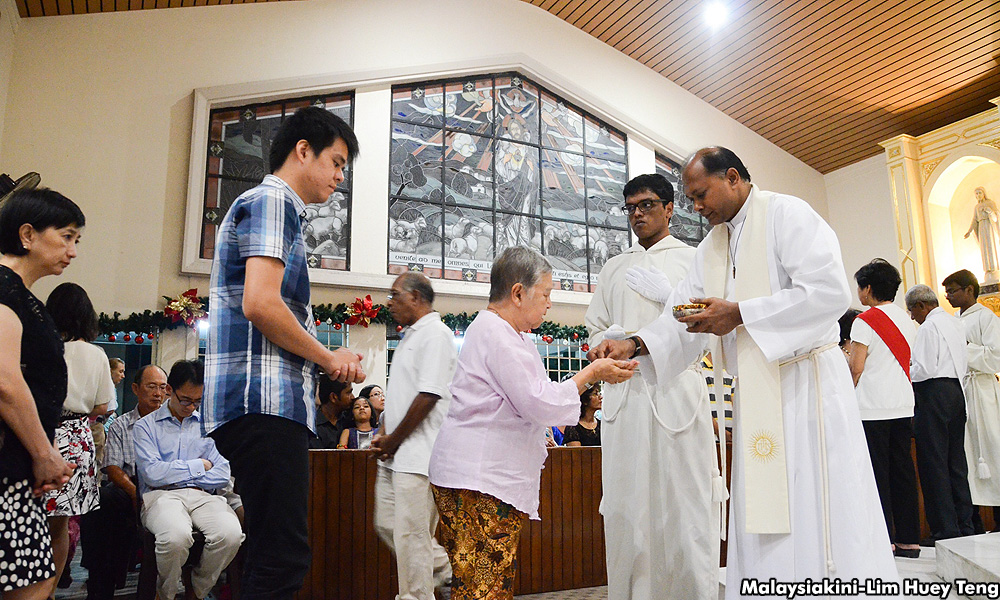COMMENT | Tengku Adnan Tengku Mansor, the caretaker federal territories minister and Umno secretary-general, followed a well-worn pattern of fearmongering when he warned recently of the threat posed by Christian evangelists.
Speaking to civil servants in Putrajaya last week, he cautioned them to be wary of the DAP (and, by extension, Pakatan Harapan) because, according to him, many DAP leaders are Christian “evangelists.”
Continuing, he stated that from Catholicism they become Protestants, and from Protestants they become evangelists and born-again Christians, Methodists, et cetera.
“If they are Catholics, I can still believe them,” he said, “but when they are evangelists, they are considered new Christians. It is a problem.”
He went on to hint that the country’s sovereignty, the special rights of the Malays, the Malay language and many other things would be “destroyed if we are not careful.”
Appalling ignorance
In the first place, his remarks reveal an appalling ignorance about the Christian faith.
He does not appear to even understand some of the Christian terms that he uses, and yet he is ready to condemn Christians. And he insults all Christians by trying to divide the Christian community into good Christians and bad Christians on the basis of their denominational affiliation.

If that is what he believes, he should explain what he thinks of the evangelical Christians who, until the dissolution of Parliament, sat with him in cabinet and are part of BN. Are they, too, considered a threat to national security or are they good Christians by virtue of their support for Umno?
The penchant of Umno leaders to divert attention from pressing national issues by constantly playing up one imaginary threat or another – the Chinese, the Christians, the Jews, et cetera – is tiresome and speaks more about their political bankruptcy than anything else.
Read more: Beware DAP's ‘Christian evangelists’, Ku Nan tells civil servants
It is, as well, simply mindboggling that a senior Umno minister would be even obtuse enough to suggest that a small minority faith community (there are less Christians than Umno members, for goodness’ sake) could depose the monarchy, overthrow the government, impose their faith on Muslims and abolish Malay rights.
And this in a country that is staunchly Islamic, where Malay-Muslims vastly outnumber other ethnic and religious groups and have a near total monopoly of political, economic and military power.
If Tengku Adnan genuinely believes that our national institutions are still so weak and vulnerable after more than 60 years of Umno rule, it would be a stunning admission that Umno has completely failed the Malays, and indeed all Malaysians, and should be promptly removed from office come May 9.
Faith and politics
Of course, everyone understands that Umno and the DAP are sworn political enemies and disagree on almost every issue. In a democracy, however, politicians discuss and debate their differences in a sensible and civilised way in order to give the voting public a better understanding of their respective positions.
What they don’t do is belittle their opponents’ religious beliefs or indulge in blatant racism and bigotry.
As a politician, Tengku Adnan should have the courage, if not the decency, to meet his political opponents head-on in a debate and challenge them on issues of importance, rather than hide behind the walls of bigotry and hate and make snide remarks about their faith.
And in case he hasn’t noticed, non-Muslim politicians have, in general, been careful not to inject their faith into politics.
You don’t hear non-Muslim politicians quoting their respective religious text, framing issues in a religious context or demonising other faiths when discussing political issues.
It is not because they are less fervent in their faith but because they understand that in a multi-faith setting it is best to leave religion out of politics.
After all, they are not in politics to promote their faith or to burnish their religious credentials but to promote policies, programmes and ideas that would help build a united, stable and prosperous nation for all Malaysians irrespective of race or religion.
The issues that matter
Tengku Adnan should also know that the Christian agenda, if there is indeed one, is the same agenda that all Malaysians share - a peaceful, united and prosperous nation. In fact, it was what Umno itself used to care about before it allowed itself to be seduced by power and privilege.
Rather than focusing on imaginary threats and sowing division and discord, therefore, Tengku Adnan might better serve voters by focusing on the issues that matter to all Malaysians – respect for the constitution, good governance, corruption, national unity, the rising national debt, and the high cost of living.
All the other issues – the position of Islam, the monarchical system, the special rights of Malay-Muslims as enshrined in the Constitution – are, in reality, non-issues because they are accepted and respected by all Malaysians including Christians. Only politically bankrupt leaders keep harping on these things because they have nothing better to talk about.
Tengku Adnan does Christians a great disservice by cynically stoking anti-Christian hostility to advance his political objectives.
It recklessly endangers the safety and security of Christians at a time when radical militants are already targeting non-Muslims’ places of worship, as the police warned recently. It also feeds the kind of sentiment that very likely led to the abduction and forced disappearance of three Christian leaders last year. He ought to be ashamed of himself.
DENNIS IGNATIUS is a former ambassador. He blogs here.
The views expressed here are those of the author/contributor and do not necessarily represent the views of Malaysiakini.

